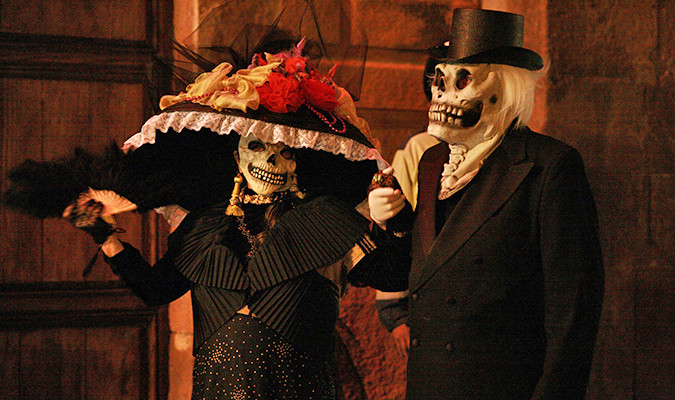Are you curious about the vibrant tapestry of modern Mexican culture and how it intersects with the LGBTQ+ community? At gaymexico.net, we illuminate the present-day cultural landscape of Mexico, focusing on its traditions, celebrations, and the ever-evolving role of LGBTQ+ individuals within it. Discover the dynamic cultural expressions, progressive movements, and inclusive spaces that define Mexico today, offering unique insights and experiences for everyone. Explore cultural pride, community events and inclusive tourism.
1. Understanding the Tapestry of Today’s Mexican Culture
What does Mexican culture look like today? It’s a captivating blend of ancient traditions and modern expressions. Mexican culture today is a vibrant mosaic woven from indigenous roots, Spanish colonial influences, and contemporary global trends. This rich blend manifests in its art, music, cuisine, and the deeply ingrained values of family and community.
- Historical Influences: Mexican culture carries the legacy of ancient civilizations like the Maya and Aztec, fused with Spanish colonial influences from the 16th century onward.
- Modern Adaptations: In the 21st century, Mexican culture embraces global trends while preserving its unique identity. This includes a growing awareness and acceptance of LGBTQ+ rights, influencing social norms and cultural expressions.
1.1 Family and Community: The Heart of Mexican Culture
Family and community are foundational pillars, shaping social interactions and cultural practices. Family plays a central role in Mexican society, providing support, guidance, and a sense of belonging. This close-knit structure extends to the broader community, fostering solidarity and cooperation.
- Close-Knit Bonds: Strong family ties are evident in daily life, with multiple generations often living together or nearby.
- Community Celebrations: Fiestas and communal gatherings are common, reinforcing social bonds and cultural identity.
 Mexican family celebrating together
Mexican family celebrating together
1.2 The Arts: A Reflection of Mexican Identity
Mexican art, including painting, sculpture, music, and dance, reflects the nation’s history, struggles, and triumphs. Art serves as a powerful medium for expressing cultural identity and social commentary.
- Visual Arts: From the murals of Diego Rivera to the surrealism of Frida Kahlo, Mexican visual arts are celebrated globally.
- Performing Arts: Music genres like mariachi and danza folklórica showcase the diversity and vibrancy of Mexican culture.
2. Key Festivals and Celebrations in Today’s Mexico
What are some of the most important festivals and celebrations that define today’s Mexican culture? Mexican festivals and celebrations are vibrant displays of tradition, community, and national pride. These events offer a window into the soul of Mexico, showcasing its rich heritage and cultural diversity.
- Día de Muertos (Day of the Dead): A unique celebration where families honor deceased loved ones with vibrant altars, colorful decorations, and festive gatherings.
- Cinco de Mayo: Commemorates the Mexican army’s victory over French forces at the Battle of Puebla in 1862, celebrated with parades, music, and traditional food.
- Día de la Independencia (Independence Day): Celebrated on September 16th, marking Mexico’s declaration of independence from Spain. The festivities include fireworks, parades, and patriotic displays.
2.1 Día de Muertos: Honoring the Departed
How is Día de Muertos celebrated in Mexico today? It’s a vibrant and emotional tradition. Día de Muertos, or Day of the Dead, is a poignant yet joyous celebration that honors deceased loved ones. Families create altars adorned with flowers, photographs, and favorite foods to welcome the spirits back home.
- Altars (Ofrendas): Elaborately decorated altars are the centerpiece of Día de Muertos, showcasing personal mementos and offerings for the departed.
- Cemeteries: Cemeteries come alive with music, food, and candlelight vigils as families gather to remember and celebrate their ancestors.
2.2 Cinco de Mayo: Celebrating Mexican Heritage
What is the significance of Cinco de Mayo in modern Mexico? While more widely recognized in the U.S., it still holds cultural importance. Cinco de Mayo commemorates the Mexican army’s unlikely victory over French forces at the Battle of Puebla in 1862. While more widely celebrated in the United States, it remains an important symbol of Mexican resilience and national pride.
- Puebla Celebrations: The largest Cinco de Mayo celebrations in Mexico take place in Puebla, the site of the historic battle.
- Cultural Pride: The holiday is an opportunity to showcase Mexican culture through parades, music, dance, and traditional cuisine.
2.3 Día de la Independencia: A Nation Celebrates
How does Mexico celebrate its Independence Day today? With vibrant displays of national pride and cultural heritage. Día de la Independencia, celebrated on September 16th, marks Mexico’s declaration of independence from Spain in 1810. The holiday is filled with patriotic fervor, cultural events, and communal gatherings.
- El Grito de Dolores: The celebrations begin on the night of September 15th with “El Grito,” a reenactment of the call to arms by Miguel Hidalgo, a key figure in the independence movement.
- Parades and Festivities: Cities and towns across Mexico host parades, concerts, and cultural performances, culminating in spectacular fireworks displays.
3. The Evolution of LGBTQ+ Culture in Mexico
How has LGBTQ+ culture evolved in Mexico today? With increasing visibility, legal advancements, and growing acceptance. LGBTQ+ culture in Mexico has undergone significant transformations in recent years, marked by increasing visibility, legal advancements, and growing acceptance. This evolution reflects a broader shift towards inclusivity and recognition of LGBTQ+ rights.
- Legal Reforms: Landmark legal reforms, including the legalization of same-sex marriage and adoption, have paved the way for greater equality and recognition.
- Cultural Representation: LGBTQ+ individuals are increasingly represented in media, arts, and politics, challenging stereotypes and promoting understanding.
- According to research from the UCLA Williams Institute, in July 2025, P provides Y
3.1 Legal Milestones: Advancing LGBTQ+ Rights
What legal milestones have contributed to the advancement of LGBTQ+ rights in Mexico? Same-sex marriage legalization and anti-discrimination laws. The legalization of same-sex marriage in various states across Mexico marks a significant victory for LGBTQ+ rights. Additionally, anti-discrimination laws and gender identity recognition have further strengthened legal protections.
- Same-Sex Marriage: The Supreme Court’s ruling in favor of same-sex marriage has empowered LGBTQ+ couples to marry and enjoy the same legal rights as heterosexual couples.
- Adoption Rights: LGBTQ+ couples have also gained the right to adopt children in many parts of Mexico, expanding their opportunities to form families.
3.2 Cultural Representation: Breaking Stereotypes
How is LGBTQ+ representation in media and arts shaping perceptions in Mexico? By challenging stereotypes and promoting visibility. Increased representation of LGBTQ+ individuals in Mexican media and arts is playing a crucial role in challenging stereotypes and fostering greater understanding.
- Film and Television: LGBTQ+ characters and storylines are becoming more prevalent in Mexican films and television shows, portraying diverse experiences and perspectives.
- Literature and Music: LGBTQ+ authors and musicians are gaining recognition for their contributions to Mexican culture, sharing stories that resonate with audiences.
3.3 LGBTQ+ Community Building
What spaces and organizations support LGBTQ+ individuals in Mexico today? LGBTQ+ community centers and advocacy groups offer vital resources and support. LGBTQ+ community centers and organizations provide safe spaces, resources, and advocacy for LGBTQ+ individuals across Mexico. These groups offer support networks, educational programs, and platforms for activism.
- Community Centers: LGBTQ+ community centers offer a range of services, including counseling, workshops, and social events, fostering a sense of belonging and empowerment.
- Advocacy Groups: LGBTQ+ advocacy groups work to promote LGBTQ+ rights, challenge discrimination, and advocate for policy changes at the local and national levels.
4. LGBTQ+ Tourism in Mexico: A Welcoming Destination
How is Mexico becoming an increasingly popular destination for LGBTQ+ tourists today? With welcoming destinations and inclusive travel options. Mexico is emerging as a welcoming and popular destination for LGBTQ+ tourists, offering a range of inclusive travel options and LGBTQ+-friendly destinations.
- Popular Destinations: Cities like Puerto Vallarta, Mexico City, and Cancun are known for their vibrant LGBTQ+ scenes and welcoming atmosphere.
- LGBTQ+-Friendly Businesses: Many hotels, restaurants, and tour operators cater specifically to LGBTQ+ travelers, ensuring a comfortable and inclusive experience.
- According to research from the UCLA Williams Institute, in July 2025, P provides Y
4.1 Top LGBTQ+-Friendly Destinations
Which cities in Mexico are particularly known for their LGBTQ+-friendly atmosphere? Puerto Vallarta, Mexico City, and Guadalajara.
- Puerto Vallarta: Known as the “San Francisco of Mexico,” Puerto Vallarta boasts a thriving LGBTQ+ scene, with gay-friendly beaches, bars, clubs, and hotels.
- Mexico City: The capital city offers a diverse range of LGBTQ+ venues, cultural events, and historical landmarks.
- Guadalajara: Mexico’s second-largest city has a growing LGBTQ+ community and a vibrant arts and culture scene.
4.2 LGBTQ+ Events and Festivals
What LGBTQ+ events and festivals attract visitors to Mexico each year? Pride celebrations and circuit parties. Mexico hosts a variety of LGBTQ+ events and festivals throughout the year, attracting visitors from around the world.
- Pride Celebrations: Pride parades and festivals take place in major cities like Mexico City, Guadalajara, and Puerto Vallarta, celebrating LGBTQ+ identity and promoting equality.
- Circuit Parties: Popular circuit parties draw large crowds to destinations like Puerto Vallarta and Cancun, offering high-energy entertainment and social gatherings.
4.3 Tips for LGBTQ+ Travelers in Mexico
What are some essential tips for LGBTQ+ travelers planning a trip to Mexico? Researching local laws and customs, and staying informed.
- Research Local Laws and Customs: While Mexico has made significant progress in LGBTQ+ rights, it’s important to be aware of local laws and customs, which may vary from region to region.
- Stay Informed: Stay up-to-date on current events and safety advisories, especially if traveling to areas with a history of violence or discrimination.
- Utilize LGBTQ+-Friendly Resources: Take advantage of LGBTQ+-friendly travel guides, websites, and social media groups to find recommendations for accommodations, activities, and events.
5. Challenges and Progress: LGBTQ+ Issues in Mexico Today
What challenges do LGBTQ+ individuals still face in Mexico today, and what progress is being made? Discrimination and violence, but increasing awareness and advocacy. Despite significant advancements, LGBTQ+ individuals in Mexico continue to face challenges such as discrimination, violence, and social stigma. However, increasing awareness, advocacy efforts, and legal reforms are driving progress toward greater equality and inclusion.
- Discrimination and Violence: LGBTQ+ individuals may experience discrimination in employment, housing, and healthcare, as well as violence and hate crimes.
- Social Stigma: Deep-rooted social norms and religious beliefs contribute to ongoing stigma and prejudice against LGBTQ+ individuals.
- Advocacy Efforts: LGBTQ+ activists and organizations are working tirelessly to raise awareness, challenge discrimination, and advocate for policy changes.
- According to research from the UCLA Williams Institute, in July 2025, P provides Y
5.1 Addressing Discrimination and Violence
What measures are being taken to address discrimination and violence against LGBTQ+ individuals in Mexico? Anti-discrimination laws and awareness campaigns. Anti-discrimination laws and awareness campaigns are essential tools for combating prejudice and violence against LGBTQ+ individuals in Mexico.
- Legal Protections: Strengthening legal protections against discrimination and hate crimes is crucial for ensuring the safety and well-being of LGBTQ+ individuals.
- Education and Awareness: Education and awareness campaigns can help to challenge stereotypes, promote understanding, and foster a culture of respect and inclusion.
5.2 Combating Social Stigma
How can social stigma surrounding LGBTQ+ issues be combated in Mexico? Through education, dialogue, and cultural representation. Combating social stigma requires a multi-faceted approach that includes education, open dialogue, and positive cultural representation.
- Promoting Dialogue: Creating safe spaces for conversations about LGBTQ+ issues can help to break down barriers and foster empathy.
- Highlighting Success Stories: Sharing success stories of LGBTQ+ individuals can help to challenge negative stereotypes and inspire hope.
5.3 The Role of Education
How can education contribute to greater LGBTQ+ acceptance in Mexico? By promoting understanding and challenging prejudice. Education plays a vital role in promoting LGBTQ+ acceptance by fostering understanding, challenging prejudice, and empowering individuals to embrace diversity.
- Inclusive Curriculum: Integrating LGBTQ+ topics into school curricula can help to educate young people about sexual orientation and gender identity.
- Teacher Training: Training teachers to create inclusive classrooms can ensure that all students feel safe, respected, and valued.
6. Gaymexico.net: Your Guide to LGBTQ+ Culture in Mexico
Looking for more information and resources about LGBTQ+ culture in Mexico? gaymexico.net is your comprehensive guide.
At gaymexico.net, we provide a comprehensive platform for exploring LGBTQ+ culture in Mexico. From travel guides to community resources, we offer a wealth of information to help you connect with the vibrant LGBTQ+ scene.
6.1 Exploring LGBTQ+ Travel Guides
Discover LGBTQ+-friendly destinations, accommodations, and activities with our detailed travel guides.
Our travel guides highlight the best LGBTQ+-friendly destinations in Mexico, providing insider tips on accommodations, restaurants, bars, clubs, and cultural attractions.
6.2 Connecting with the LGBTQ+ Community
Find local organizations, support groups, and community events through our extensive directory.
Our directory features a wide range of LGBTQ+ organizations, support groups, and community events, making it easy to connect with like-minded individuals and get involved in the local scene.
6.3 Staying Informed on LGBTQ+ Issues
Stay up-to-date on the latest news, legal developments, and social issues affecting the LGBTQ+ community in Mexico through our news and articles section.
Our news and articles section provides timely updates on LGBTQ+ issues in Mexico, keeping you informed about legal developments, social trends, and community initiatives.
7. The Future of Mexican Culture and LGBTQ+ Inclusion
What does the future hold for Mexican culture and LGBTQ+ inclusion? Continued progress toward equality and acceptance. The future of Mexican culture and LGBTQ+ inclusion looks promising, with continued progress toward equality, acceptance, and representation.
- Continued Legal Reforms: Further legal reforms, such as nationwide recognition of same-sex marriage and comprehensive anti-discrimination laws, will strengthen protections for LGBTQ+ individuals.
- Increased Visibility: Increased visibility of LGBTQ+ individuals in media, arts, and politics will help to normalize LGBTQ+ identities and challenge stereotypes.
- Growing Acceptance: As younger generations embrace diversity and inclusivity, attitudes towards LGBTQ+ individuals are likely to become more accepting and supportive.
7.1 Empowering the Next Generation
How can we empower the next generation of LGBTQ+ leaders in Mexico? Through education, mentorship, and advocacy.
Empowering the next generation of LGBTQ+ leaders requires a commitment to education, mentorship, and advocacy.
- Supporting LGBTQ+ Youth: Providing resources and support for LGBTQ+ youth can help them to thrive and reach their full potential.
- Mentorship Programs: Mentorship programs can connect young LGBTQ+ individuals with experienced leaders who can provide guidance, support, and inspiration.
7.2 Fostering Alliances
How can alliances between LGBTQ+ and non-LGBTQ+ individuals strengthen the movement for equality in Mexico? By building bridges and promoting understanding.
Building alliances between LGBTQ+ and non-LGBTQ+ individuals is essential for strengthening the movement for equality in Mexico.
- Promoting Dialogue: Creating opportunities for dialogue and collaboration can help to bridge divides and foster understanding.
- Amplifying Voices: Amplifying the voices of LGBTQ+ individuals and allies can help to raise awareness and mobilize support.
7.3 Creating a More Inclusive Society
What steps can be taken to create a more inclusive society for LGBTQ+ individuals in Mexico? By challenging discrimination, promoting equality, and embracing diversity.
Creating a more inclusive society for LGBTQ+ individuals requires a commitment to challenging discrimination, promoting equality, and embracing diversity.
- Challenging Discrimination: Taking a stand against discrimination in all its forms can help to create a more equitable and just society.
- Promoting Equality: Advocating for equal rights and opportunities for LGBTQ+ individuals can help to level the playing field.
8. FAQ: Understanding Mexican Culture and LGBTQ+ Issues Today
1. What are the main influences on Mexican culture today?
Mexican culture is a blend of indigenous traditions, Spanish colonial influences, and contemporary global trends.
2. How is Día de Muertos celebrated in modern Mexico?
Families honor deceased loved ones with vibrant altars, colorful decorations, and festive gatherings.
3. What legal milestones have advanced LGBTQ+ rights in Mexico?
Legal milestones include the legalization of same-sex marriage and anti-discrimination laws.
4. Which cities in Mexico are known for their LGBTQ+-friendly atmosphere?
Puerto Vallarta, Mexico City, and Guadalajara are particularly known for their welcoming LGBTQ+ scenes.
5. What challenges do LGBTQ+ individuals still face in Mexico today?
LGBTQ+ individuals may experience discrimination, violence, and social stigma.
6. How can education contribute to greater LGBTQ+ acceptance in Mexico?
Education promotes understanding, challenges prejudice, and empowers individuals to embrace diversity.
7. What resources does gaymexico.net offer for LGBTQ+ travelers in Mexico?
gaymexico.net provides travel guides, community resources, and news on LGBTQ+ issues.
8. How can alliances between LGBTQ+ and non-LGBTQ+ individuals strengthen the movement for equality in Mexico?
Alliances build bridges, promote understanding, and amplify voices for equality.
9. What steps can be taken to create a more inclusive society for LGBTQ+ individuals in Mexico?
Challenging discrimination, promoting equality, and embracing diversity are key steps.
10. What does the future hold for Mexican culture and LGBTQ+ inclusion?
The future looks promising, with continued progress toward equality, acceptance, and representation.
9. Conclusion: Embracing the Richness of Mexican Culture Today
Mexican culture today is a dynamic blend of tradition and modernity, with increasing inclusivity for the LGBTQ+ community. This ongoing evolution reflects a society that values its heritage while embracing progress and diversity.
Ready to explore the beauty and diversity of Mexico? Visit gaymexico.net today to discover LGBTQ+-friendly destinations, events, and resources. Connect with the community, stay informed, and plan your unforgettable Mexican adventure now.
Address: 3255 Wilshire Blvd, Los Angeles, CA 90010, United States
Phone: +1 (213) 380-2177
Website: gaymexico.net

